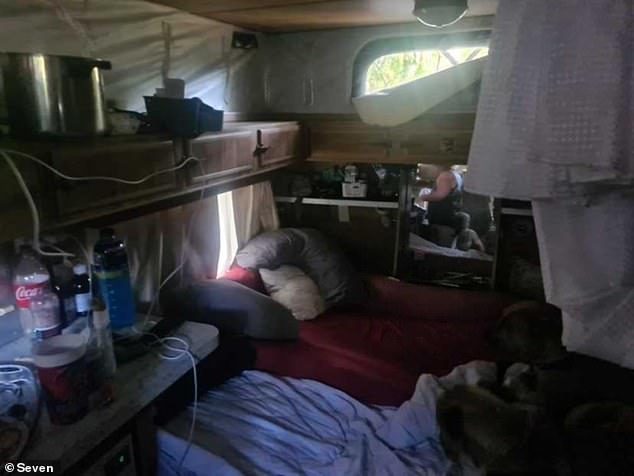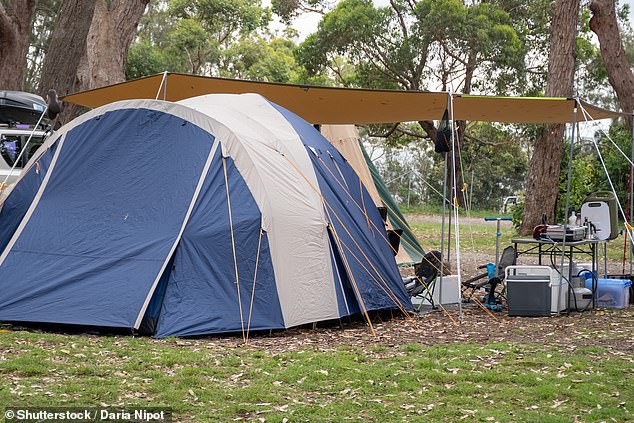Western Australian family-of-four forced to live in a caravan after being booted from their rental
A family of four have been left homeless and forced to live in a friend’s caravan amid Australia’s ongoing housing crisis.
West Australian man Steven, who wanted to be known only by his first name, his wife, two young children and their pets, became homeless when they had to leave their last rental property.
Steven said he and his family now live in a friend’s 15ft caravan in Bunbury, in the state’s south-west.
He said the limited space in the caravan was problematic for his family.
A Western Australian family of four has been left living in a caravan after being forced to leave their rental home
“There’s just no room… I can barely get up and move around in the caravan, let alone with three other people in it,” the 38-year-old said 7News.
The family are now being evicted from the van due to a strict 27 day stay limit imposed by the caravan park.
“Then we move into a tent … with our dogs and a six-year-old and a four-year-old running around screaming and climbing trees and yelling at each other,” Steven said.
The family applied for several three-bedroom homes with the state’s homelessness agency, but were told they had to occupy a four-bedroom house.
“We applied to get on the list and there were a lot of three-bedroom houses, but they said we needed four bedrooms because of the number of people in our family… our pets and their policies,” Steven said. .
“Somehow, as a father, with all these policies in play, I can’t even decide what is and isn’t right for my family.
“I think a roof over our heads is better than no roof.”

The family are now being evicted from the van due to a strict 27 day stay limit imposed by the caravan park
Steven said his family is now officially classified as homeless and eligible for assistance from the Salvation Army, but the organization has indicated there will be a long wait for a home.
The struggling family are now considering setting up a three-room tent at another caravan park in regional Western Australia.
“Then we can put a tent there permanently and actually have a little bit of space and a room for each of us,” he said.
Steven said setting up the tent costs the family $300 a week.
“We’re really just trying to make the best of a bad situation,” he said.
Australian Bureau of Statistics (ABS) data from the 2021 census showed about 9700 people in WA were homeless, of whom 2315 were rough sleeping.
According to the 2021 Census, approximately 122,494 people experience homelessness across Australia on any given evening.
This was an increase of about 6,067 people, or 5.2 percent, since the previous census in 2016.

Approximately 122,494 people experience homelessness on any given night across the country (stock image pictured)
Housing advocates are urgently calling for greater government commitment to investing in social and affordable housing.
Everybody’s Home spokeswoman Maiy Azize said the stock of social housing was declining, while housing stress and homelessness were on a sharp upward trend.
“Renting has never been so cheap,” she says.
‘Housing stress has become the fastest growing cause of homelessness.’
Meanwhile, the Australian Council of Social Services has said the government should invest directly in more homes for people on the lowest incomes, and encourage super funds and individuals to invest in new affordable housing.
The Housing Australia Future Fund, touted by the federal government as the largest ever investment in affordable housing in Australian history, was passed by the Senate in September.
Based on a proposal from the Grattan Institute, the fund is expected to support the construction of 20,000 social homes and 10,000 affordable homes over the next five years.
The bill stalled in the Senate for months, with the Coalition opposing it and the Greens refusing to lend their support until Labor agreed to back some of their own housing proposals.
The Greens agreed to support the bill in exchange for an additional $1 billion for social housing, on top of the $2 billion in additional social housing funds the federal government gave to the states in June.
